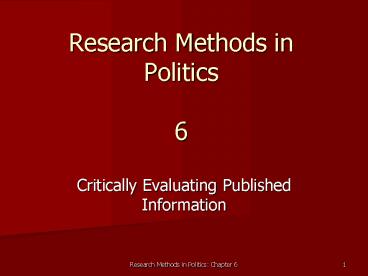Research Methods in Politics 6 - PowerPoint PPT Presentation
1 / 10
Title:
Research Methods in Politics 6
Description:
Research Methods in Politics 6 Critically Evaluating Published Information Teaching and Learning Objectives to learn how to critically evaluate published research ... – PowerPoint PPT presentation
Number of Views:57
Avg rating:3.0/5.0
Title: Research Methods in Politics 6
1
Research Methods in Politics6
- Critically Evaluating Published Information
2
Teaching and Learning Objectives
- to learn how to critically evaluate published
research using research component analysis and, - to apply Roses ABCDE model (1982) for
deciphering research
3
Research Component Analysis
- when
- where
- who
- abstract
- research question and rationale
- theory and literature review
- Hypothesis
- methodology
- data collection what,
- when, how
- data presentation
- data analysis, interpretation and
discussion - conclusions
- implications
- style
- referencing and bibliography.
4
Roses ABCDE deciphering model
- A Theory an explanatory statement about social
phenomena. ?
? ? - B Theoretical Proposition specific propositions
to be ? - investigated in the study. ?
- ? ?
- C Operationalisation decisions made on how to
carry out ? - empirical work techniques of data collection
sampling ? - concepts and indicators variables units.
? - ?
- D Fieldwork collecting data practical problems
of ? implementing Stage C
decisions. ?
? ? - E Results data analysis leads to findings
interpretation leads back to C, B, and A
5
Three-Stage Framework for Evaluating Research
- Relationship to other theory and research
- ?
External validity
- A Theory ?
- ? Internal theoretical
validity - B Theoretical Proposition ?
- ?
- C Operationalisation ?
- ? Internal empirical validity
- D Fieldwork ? ?
- E Results ?
6
Roses Strategy for Evaluating Theory-Testing,
Quantitative Research
- 1. summarise the research into ABCDE stages
- 2. assess the operationalisation in C
concept-indicators, samples, units and variables - 3. add further descriptive details of the
researchers theoretical exposition and
theory-evidence linkages and, tables of data
presented, reliability and accuracy, and
interpretation - 4. assess the internal empirical validity by
examining the fit between the data and its
interpretation - 5. assess the internal theoretical validity, i.e.
the relationship between A (theory) and B
(hypothesis) and, - 6. conclude with a general assessment which
consolidates the separate assessments made and
makes an assessment of the overall contribution
of the research to the discipline. (Rose, 1982
104-05)
7
Roses Strategy for Evaluating Theory-Building
Research Utilising Qualitative Data
- summarise the research report into its ABCDE
stages stating its natural history (origins and
development) the data and methods of collection
sampling method of analysis and, presentation
of results - evaluate in turn the validity of the
concept-indicator links theory and, sampling
and generalisation and, - conclude by reviewing the consistency (or
otherwise) of the various validities and other
factors and assessing of the overall contribution
of the new theory to the discipline (Rose, 1982
130-02)
8
Questions for Discussion or Assignments
- Consider the concepts of conflict freedom
liberty hegemony and, consciousness of
identity. What concept-indicators would you
suggest for these? Why? What data would you
collect? - For undergraduates You are a distinguished
academic. You have been asked by the editor of a
refereed journal to act as a referee for draft
research report. Select one of the two published
reports - Bevir, M., and Rhodes, R A W. (2006) Prime
Ministers, Presidentialism and Westminster
Smokescreens IN Political Studies, vol. 54,
Number 4, pp. 671-90 OR, - Chaney, P. (2006) Critical Mass, Deliberation
and the Substantive Representation of Women
Evidence from the UKs Devolution Programme IN
Political Studies, vol. 54, Number 4, pp.
691-714. - Write your assessment using the letter
(below)
9
- Dr Arial Helvetica USR
- Editor, New Politics Digest Department of
Politics - University of Watersea
- Dear Arial
- title of draft research paper
- Thank you for inviting me to referee this paper.
- Overall, my view is that, whilst this excellent
paper breaks new ground, there are a number of
areas where minor revisions and additions would
be helpful. - Let me begin by summarising what I believe are
the research question, theoretical framework,
hypothesis and key concepts. The research
question, etc are 200-300 words - The strengths of the paper are 300-400 words
- The weaknesses are 300-400 words
- I would also like to comment on the style of the
paper 200-300 words - The paper is, of course, suitable for publication
in New Politics Digest. However, I would suggest
a number of changes. They are 200-300 words
10
Questions for Discussion or Assignments
- For graduates
- 3. Select a research report on a subject that
interests you from a refereed journal in your
university library. Evaluate it critically using
research component analysis or Roses strategies.
Attach a copy of the research paper to your
assignment showing what you concluded were the
various analytical components. How could the
research and the report be improved?































